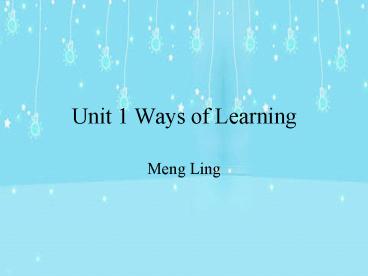Unit 1 Ways of Learning PowerPoint PPT Presentation
1 / 18
Title: Unit 1 Ways of Learning
1
Unit 1 Ways of Learning
- Meng Ling
2
Education in the West (1)
- There is no common agreement in the West
concerning the best method of education. A
variety of views can be found among parents,
teachers and students. Indeed, it might be argued
that it is this very existence of contending
points of view that is characteristic of Western
education. This can be seen as far back as in the
work of the ancient Greek philosopher Socrates,
who encouraged his students to question
everything, even their most fundamental beliefs.
Yet even then there was no general agreement that
this was the best way to teach.
3
Education in the West (2)
- Much of the current debate over education
surrounds - the extent to which learning should be
teacher-based or - student-based. Which of the two should decide
what - should be learned, how it should be learned, and
when it - should be learned?
- Comparing Western and Asian methods of learning
it - is generally true that Western methods are more
student- - centered, expecting students to discover things
for - themselves rather than relying on their teachers
to tell - them.
4
Education in the West (3)
- An extreme version of the student-centered
- approach can be seen at Summerhill, a school in
- England established by the educationalist A.S.
- Neill. There children have complete freedom to
- decide what they are going to learn and which
- lessons they will attend. If they wish they need
not attend any at all.
5
A Survey
Do you agree with the following statements?
1. Play is the best way to learn. 2. Children
develop life skills best through formal
programs. 3. Children are naturally curious,
inspired, motivated learners, but enjoyment of
learning can get lost in the pressure to
succeed in formal education. 4. Parents are the
most important instructors to the children, so
they should give as much guidance as possible.
6
A Practical Experiment
Two children are given hula hoops, a toy they are
unfamiliar with.
Angela is given a hula hoop with instructions on
how to use it. Jonathan is given a hula hoop but
no instructions. What kind of outcomes do you
expect?
7
- Angela learns to keep the hula hoop in motion by
moving her body in certain ways. - Jonathan explores the hoop and discovers it's big
enough to step through. He then balances the hoop
between two objects and practices kicking a ball
through the hoop. - How do you comment on these two outcomes?
8
- Both outcomes are good.
- Angela learns a useful play skill.
- Jonathan uses his hoop in a different, but
equally playful way. - Which one do you think is better in developing
the childrens creativity?
9
- Angela, because she followed the directions
given, will have a skill she can use anytime she
wants to move her body in that specific way. The
outcome is limited to having followed directions
and mastered a particular skill. - Jonathan, on the other hand, had the experience
of exploring and discovering an item he was
unfamiliar with. He used what he learned about
this circular-shaped object to solve a problem of
his own and incorporated (??) the hula hoop as an
innovative solution to help him do something that
he wanted to do -- kick a ball through a target.
Jonathan learned he could use his own observation
and exploration to learn about new objects. - What conclusion can you draw from this
experiment?
10
- Problem Solving
- Imagine yourselves to be slow learners and tell
the class what difficulties you have in your
English study. The rest of the class should be
ready to help find out your problems, offer
advice and help to improve your study habits.
11
Synonyms neglect, ignore omit ?????
- neglect ????????????????????????????????,????????
- ignore ??????,?????????????,??????????????
- omit ????????????,???????????????????????????????
12
Examples
- ??????????
- ????????????
- ????????????
- Those who neglect their duties should be
punished. - The teacher ignored my difficult questions.
- He should not omit to visit the museum.
13
Synonyms investigate, examine inspect ?????
- investigate ???,???????????????????,??????????????
?????? - examine ?????,??????????????????????????????,?????
????????,????? - inspect ???,????examine??,??????????????,?????????
?????????????????????????,???????
14
Examples
- The firemen ______________ the warehouse for
potential fire hazards. - They ____________ the cause of the accident.
- They ____________ our passports very carefully.
were inspecting
investigated
examined
15
Synonyms accomplish, complete finish ??
- accomplish ??? task, aim, journey,
voyage???,?????????? - complete ?accomplish ??,?????????????,????????????
?????????????,????????????? - finish ????????complete??,???complete??,??????????
????????????,????????
16
Examples
- ?????????????
- ??????????????????
- ???????????
- Finish the work off before you leave for your
holiday. - I dont feel our visit really accomplished
anything. - The building will be completed by the end of this
month.
17
Synonyms promote further
- promote ???????????,???????
- further ??????????????????
- Examples
- __________ the understanding between the two
countries - __________ her study abroad
promote
further
18
- Remember to - -
- Review Unit 1 and preview and study Text A of
Unit 2, Integrated Course 2 - Finish reading Unit 1, Reading Course 2
- Finish fast reading Unit 1, Fast Reading Course 2
- Finish listening to Unit 1-2, Listening
Speaking Course 2 - Discuss topics with your group members to
practice oral English

